Do your reading glasses seem to follow you everywhere? London’s eye specialists now recommend a revolutionary procedure – lens replacement surgery – that could free you from this daily hassle. This surgical option, known as Refractive Lens Exchange (RLE), helps solve many vision problems that come with ageing.
London clinics make the lens replacement process smooth and comfortable. The surgery takes just 20-30 minutes per eye with local anaesthesia. Most patients see better vision within 24-48 hours after the procedure. Quick recovery time makes this option popular among London eye surgeons. The artificial intraocular lens used in the surgery lasts a lifetime, which gives you a permanent solution to break free from visual aids.
This piece explores why London eye specialists prefer lens replacement surgery to treat presbyopia. The procedure works especially well when you have passed 50 and can’t get laser eye surgery because of thin or irregular corneas. You’ll learn about the advantages and disadvantages of lens replacement surgery, how the procedure works, and what lens options you can choose to make the right decision about your vision care.
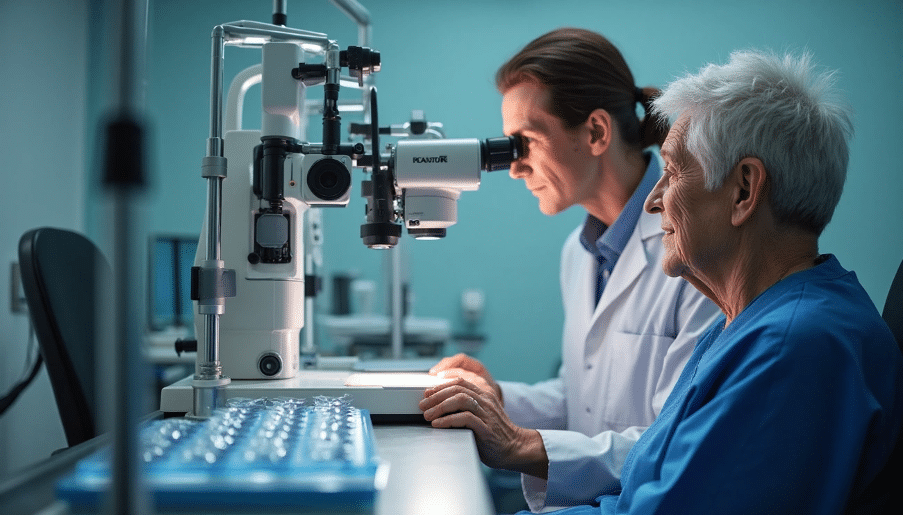
What is lens replacement for presbyopia?
Lens replacement for presbyopia surgically removes your eye’s natural lens and puts in an artificial intraocular lens (IOL). This technique, also called Refractive Lens Exchange (RLE) or clear lens extraction, permanently fixes age-related vision problems. Reading glasses only work temporarily, but lens replacement surgery tackles presbyopia’s root cause – your eye’s natural lens becoming harder with age.
The procedure works just like cataract surgery. The main difference lies in what gets removed – a clear lens that’s lost its flexibility instead of a cloudy one affected by cataracts. You’ll only need local anaesthesia, and each eye takes about 10-15 minutes to complete as an outpatient procedure.
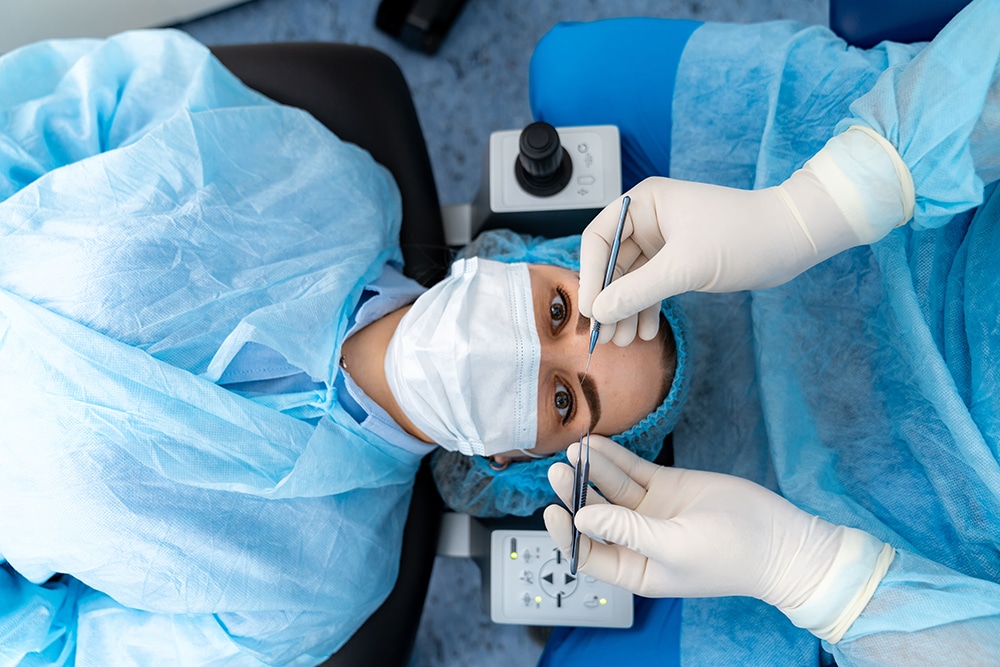
How it is different from laser eye surgery
Both procedures want to fix vision problems, but they work in completely different ways. Laser eye surgery (like LASIK or PRK) fixes refractive errors by reshaping your eye’s cornea – the outer window. Lens replacement surgery takes out your natural lens and puts in a new one.
Laser eye surgery helps with myopia, hyperopia and astigmatism. Lens replacement can fix all these plus presbyopia. Another benefit: laser surgery won’t stop cataracts from forming, but lens replacement makes it impossible to get cataracts since your natural lens gets removed.
London specialists often recommend lens replacement to people over 50. It offers two benefits in one: better vision and no chance of cataracts.
Who is it suitable for?
Lens replacement for presbyopia works best for:
- People over 40 who find reading glasses or bifocals frustrating
- Anyone with presbyopia plus other vision problems
- People whose severe farsightedness or nearsightedness rules out laser eye surgery
- Patients over 50 looking to reduce their dependence on glasses
- People with astigmatism (special toric IOLs can help)
Most candidates are over 40, but UK specialists say the ideal age starts at 50. By then, presbyopia has fully developed, and the benefits clearly outweigh the risks. Research shows that “about 95% of patients achieve vision of driving standard or better” after surgery, and about 4 out of 5 people don’t need glasses anymore.
Common vision issues it treats
Lens replacement surgery fixes several vision problems at once. It corrects presbyopia that makes reading small print hard. The surgery also helps with hyperopia (farsightedness) and myopia (nearsightedness), even when they’re too severe for laser surgery.
Toric lenses can fix astigmatism and give clearer vision to patients with irregularly shaped corneas. Extended depth of focus (EDOF) lenses and multifocal options let you see clearly at all distances – near, middle, and far. Many patients don’t need glasses afterward.
London clinics offer different lens types to match your specific vision needs. The implanted lens stays stable and works for life, unlike presbyopia that gets worse as you age.
Why London eye surgeons recommend this procedure
London stands out as the top destination for lens replacement surgery, particularly for presbyopia treatment. Eye care specialists in the capital recommend this procedure over other options for several compelling reasons.
Access to top ophthalmologists
London’s concentration of world-class eye specialists gives patients a unique access to expert care. Precision Vision London, to name just one example, brings together specialists who focus on specific parts of the eye. Patients receive treatment from surgeons who have vast experience in lens replacement procedures.
The credentials of London’s eye surgeons speak volumes. Many have board certification across multiple countries and hold key positions in prestigious ophthalmological institutions. This global recognition shows the exceptional care available to lens replacement patients in the capital.
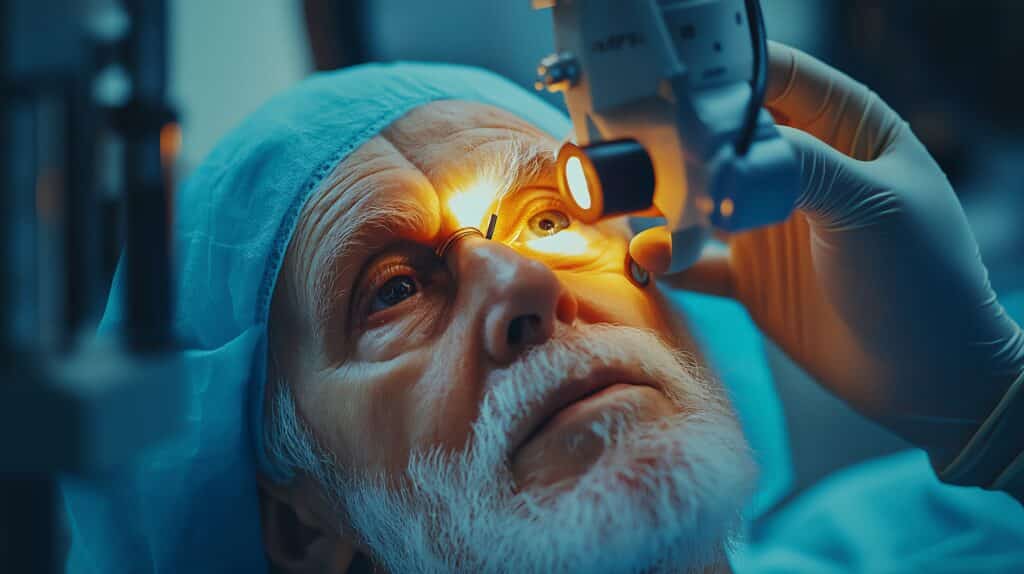
Advanced surgical technology
Leading London clinics use cutting-edge equipment that lets surgeons perform lens replacement with pinpoint accuracy. Modern diagnostic tools analyse each patient’s unique optical characteristics. This creates customised treatment plans with the best possible outcomes.
Presbyopia patients benefit from more accurate lens selection and placement. They get clearer vision across multiple distances. The advanced surgical techniques reduce eye trauma and speed up healing.
High success rates and patient satisfaction
London surgeons recommend lens replacement for presbyopia because of its soaring win rate. Studies show that over 95% of patients achieve 20/40 vision or better after surgery – meeting the legal standard for driving in most places. Patients report high satisfaction levels and major improvements in their quality of life after surgery. Most can live without glasses or contact lenses for most activities. This achieves the main goal of presbyopia treatment.
Lens replacement surgery’s safety record strengthens London specialists’ recommendation. It ranks among the safest and most common procedures worldwide. European surgeons perform more than 3 million surgeries each year. Though all surgeries have risks, complications rarely occur and respond well to medication or follow-up procedures.
Regain Clear Vision at All Distances – Book a Presbyopia Lens Replacement Consultation with London’s Trusted Surgeons at Precision Vision London Today.
Private lens replacement in London offers extra benefits that boost these success rates:
- More intraocular lens options, including premium multifocal and toric lenses
- Personalised care with shorter waiting times
- A chance to pick your surgeon based on their expertise and track record
Yes, it is true that while the simple surgical procedure stays similar between private and NHS settings, private care’s wider lens options and personal attention often result in happier patients. London’s mix of surgical expertise, modern technology, and proven results makes it an excellent choice for anyone seeking presbyopia lens surgery in the UK.
The lens replacement surgery process explained
The trip to clearer vision through lens replacement surgery follows a well-laid-out process that delivers personalised results for each patient. London specialists use advanced techniques to ensure the best outcomes for presbyopia treatment.
Original consultation and eye assessment
A full evaluation must happen before any lens replacement procedure. Your consultation typically takes 90 minutes to 3-4 hours, based on the clinic and your specific needs. Specialists measure:
- Your refractive error (nearsightedness, farsightedness, astigmatism or presbyopia)
- Pupil size and function
- Cornea curve and shape
- Eye length from cornea to retina
Tests include vision checks with and without glasses, corneal topography, intraocular pressure measurement, and pupil dilation to examine the retina. These complete measurements help determine if lens replacement surgery suits you and shape your surgical plan.
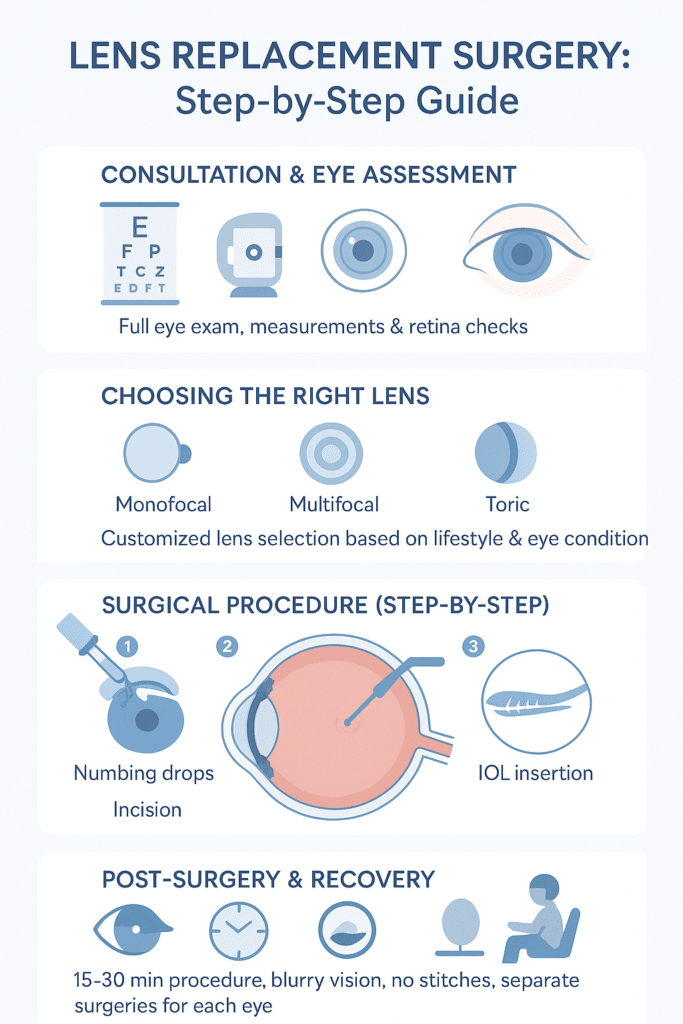
Choosing the right intraocular lens (IOL)
The right lens choice is vital to achieve optimal vision outcomes. Your surgeon will explain your options based on your lifestyle needs and eye measurements:
- Monofocal lenses for clear distance vision
- Multifocal and trifocal lenses for vision at multiple distances
- Toric lenses to correct astigmatism
- Extended depth of focus (EDOF) lenses for boosted intermediate vision
Multifocal options can substantially reduce your need for reading glasses if you have presbyopia. Your surgeon will help set realistic expectations during consultation.
Step-by-step breakdown of the surgery
Lens replacement is a quick and precise procedure:
- Your eye receives numbing drops
- Small incisions (about 2.5mm) are made near the cornea’s edge
- The surgeon breaks up your natural lens using ultrasound (phacoemulsification)
- These fragments get gently vacuumed out through the incision
- The folded IOL goes in and sits within the existing lens capsule
- The incision seals itself, usually without stitches
What to expect on surgery day
You’ll get anaesthetic eye drops and possibly mild sedation to keep you comfortable. The procedure takes only 15-30 minutes per eye, but plan to spend several hours at the clinic. Most patients return home the same day with a protective shield over their operated eye. Your vision will be blurry at first, so you’ll need someone to drive you home. If both eyes need treatment, your surgeon will operate on them separately, usually one to two weeks apart. This gap lets your brain adjust to the new lens.
Types of intraocular lenses used in presbyopia treatment
Choosing the right intraocular lens (IOL) is maybe the most important decision to treat presbyopia. Modern lenses offer different benefits based on your vision needs and lifestyle. Let’s look at the main types you can find at lens replacement London clinics.
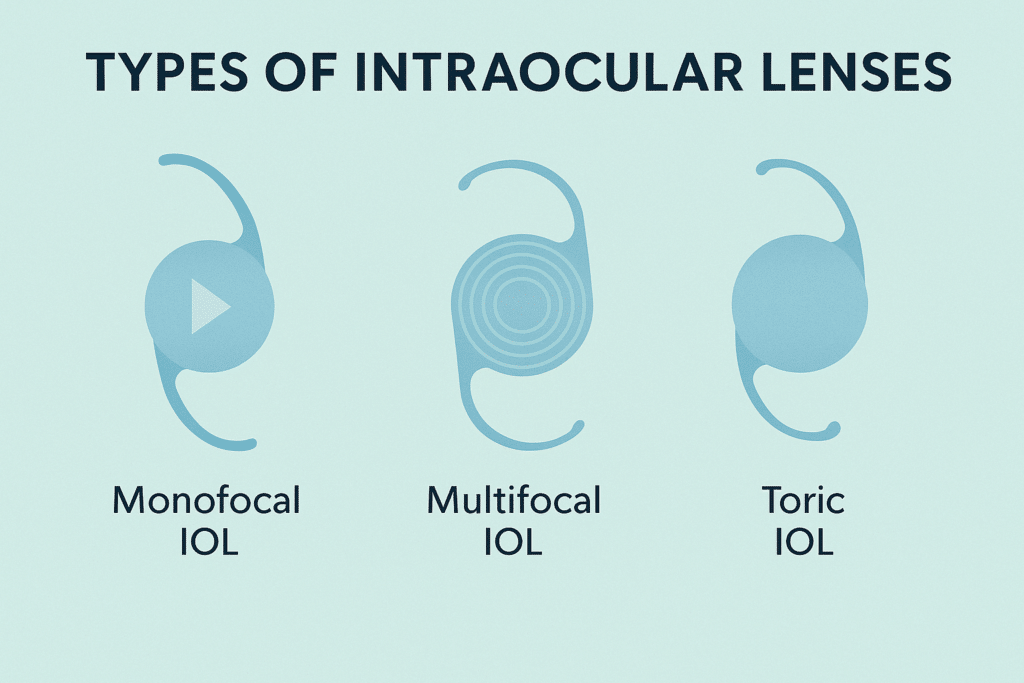
Monofocal lenses
These traditional lenses were the first IOLs used in cataract surgery and remain accessible to more people today. Monofocal lenses give excellent vision at one specific distance—usually set for far vision. They deliver reliable visual clarity with better contrast, but you’ll need reading glasses for close-up tasks. So, the NHS offers these lenses as standard during cataract procedures. Monofocal lenses work best if you want simplicity, reliability, and budget-friendly options. However, they don’t deal very well with all presbyopia symptoms.
Multifocal and trifocal lenses
Multifocal lenses changed how we treat presbyopia by offering vision at multiple distances. Bifocal versions create two focal points – one for distance and one for near vision. Trifocal lenses add a third focal point for intermediate vision at computer distance, which gives a more complete visual range.
These advanced lenses use diffractive or refractive designs. Diffractive types have concentric rings on the lens surface that split light to create multiple focal points. Your brain learns to pick the right focus automatically. Many presbyopia lens surgery UK specialists now suggest trifocal options because they offer the most detailed solution if you want freedom from glasses.
Toric lenses for astigmatism
Toric lenses provide specialised correction if you have both presbyopia and astigmatism. Astigmatism happens when your cornea’s shape becomes irregular and causes blurred vision. Toric lenses have different powers in different meridians to fix this irregularity. These can work with multifocal technology to correct both presbyopia and astigmatism at once—a major advancement that refractive lens exchange London clinics now provide.
Extended depth of focus (EDOF) lenses
EDOF lenses showcase the newest technology in presbyopia treatment. Unlike multifocal lenses with distinct focal points, EDOF lenses create one elongated focal point that extends clear vision range. This design reduces visual disturbances like glare and halos that can occur with multifocal options. They excel at providing excellent distance and intermediate vision, with functional near vision as well. This makes them ideal especially when you have an active lifestyle.
Benefits and long-term outcomes of lens replacement
Lens replacement surgery delivers exceptional results and has become a popular treatment for presbyopia. Clinical data shows that patients see improvements way beyond simple vision correction.
Improved vision at all distances
The vision results after surgery are remarkable. Studies reveal that 96.2% of patients achieve 20/40 or better monocular distance vision. The numbers look even better for binocular vision, with 99.5% reaching 20/40 or better. These success rates hold strong in difficult cases – 99% of highly myopic eyes and 93% of highly hyperopic eyes achieve 20/40 vision or better. Patients also report excellent results for intermediate and near vision. About 84% are happy with their mid-range vision and 74% express satisfaction with their near vision.

Reduced dependence on glasses
The most transformative benefit comes from freedom from eyewear. About four in five patients no longer need glasses after getting modern multifocal IOLs. Premium multifocal lenses help 80-93% of patients become independent from glasses. Some patients might need glasses occasionally, but only for specific tasks. This newfound freedom lets patients enjoy a more active lifestyle without visual limitations.
Prevention of cataracts
Lens replacement offers an advantage over laser procedures by eliminating future cataract risks. This benefit matters especially when you have patients near retirement age, as early cataract signs often show up. The procedure removes the natural lens where cataracts develop, providing lifelong protection against this age-related condition.
Regain Clear Vision at All Distances – Book a Presbyopia Lens Replacement Consultation with London’s Trusted Surgeons at Precision Vision London Today.
Quick recovery and minimal downtime
Vision improves noticeably within 24-48 hours for most patients. The healing takes just 2-3 days, and vision stabilises within 4-6 weeks. Patients experience mild discomfort and can return to normal activities within a week. Many can drive within three days after having both eyes treated.
Long-lasting results
Intraocular lenses used in London’s presbyopia treatment clinics last a lifetime. These artificial IOLs maintain their quality unlike natural lenses that age. Vision stays stable after surgery unless new eye conditions develop. A quick YAG capsulotomy laser procedure can restore clarity in rare cases where vision deteriorates years later.
Conclusion
Lens replacement surgery has become a game-changing solution for people with presbyopia, especially when they’re over 40. London’s top ophthalmologists now recommend this procedure more than traditional options. The surgery can fix multiple vision problems at once and stops cataracts from developing later in life.
London’s world-class eye specialists use cutting-edge surgical technology to deliver outstanding results. The procedure’s 95% success rate in helping patients achieve driving-standard vision shows why refractive lens exchange leads the way in presbyopia treatment. On top of that, doctors can choose from various intraocular lenses to match each patient’s vision needs and lifestyle.
The benefits of lens replacement far exceed any potential risks for the right candidates. Patients recover quickly, depend less on glasses, and enjoy lasting results that beat temporary fixes like reading glasses. The surgery tackles presbyopia’s root cause by replacing the hardened natural lens. This works better than laser procedures that just reshape the cornea.
Do you find yourself always grabbing your reading glasses? Are multiple vision problems giving you trouble? A specialist consultation about lens replacement could be your first step toward better vision. Most patients love how much their life improves after surgery. Without doubt, when London’s experienced surgeons use premium intraocular lenses, patients can look forward to clearer, more convenient vision at every distance for years to come.
FAQs
Q1. What types of lenses are available for presbyopia treatment? There are several types of intraocular lenses (IOLs) used in lens replacement surgery for presbyopia. These include monofocal lenses for clear distance vision, multifocal and trifocal lenses for vision at multiple distances, toric lenses to correct astigmatism, and extended depth of focus (EDOF) lenses for enhanced intermediate vision.
Q2. How long does it take to recover from lens replacement surgery? Most patients notice significant vision improvement within 24-48 hours after surgery. The initial healing typically takes 2-3 days, with full stabilisation occurring within 4-6 weeks. Many patients can resume normal activities within a week and may be able to drive within three days if both eyes have been treated.
Q3. Can lens replacement surgery prevent cataracts? Yes, lens replacement surgery eliminates the possibility of developing cataracts later in life. By removing the natural lens where cataracts form and replacing it with an artificial intraocular lens, the procedure provides lifelong protection against this common age-related condition.
Q4. What percentage of patients achieve independence from glasses after lens replacement? Approximately four out of five patients (80%) become completely glasses-free after surgery with modern multifocal IOLs. With premium multifocal lenses, between 80-93% of patients achieve independence from glasses. Even those who occasionally need glasses typically require them only for specific activities.
Q5. How long do the results of lens replacement surgery last? The intraocular lenses used in lens replacement surgery are designed to last a lifetime. Unlike natural lenses, artificial IOLs do not deteriorate with age. Barring any new eye health conditions, vision typically remains stable after surgery, providing long-lasting results for patients.
Authors & Reviewer
-
 Olivia: Author
Olivia: AuthorHi, I'm Olivia, a passionate writer specialising in eye care, vision health, and the latest advancements in optometry. I strive to craft informative and engaging articles that help readers make informed decisions about their eye health. With a keen eye for detail and a commitment to delivering accurate, research-backed content, I aim to educate and inspire through every piece I write.
-
 Dr. CT Pillai: Reviewer
Dr. CT Pillai: ReviewerDr. CT Pillai is a globally recognised ophthalmologist with over 30 years of experience, specialising in refractive surgery and general ophthalmology. Renowned for performing over 50,000 successful laser procedures.

